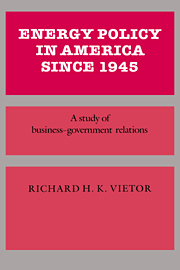Book contents
- Frontmatter
- Contents
- List of charts and figures
- List of tables
- Editors' preface
- Acknowledgments
- List of abbreviations
- 1 Introduction: The political economy of energy
- Part I The transition to peace and fluid fuels, 1945–1958
- 2 The foundations of postwar policy
- 3 “Stepping right out” with synthetic fuels
- 4 Regulating natural gas in the absence of economics
- 5 Oil imports: the failure of voluntarism
- Part II Managing surplus through the politics of stasis, 1959–1968
- Part III The second energy transition: adjustment to depletion, 1969–1980
- Index
2 - The foundations of postwar policy
Published online by Cambridge University Press: 13 October 2009
- Frontmatter
- Contents
- List of charts and figures
- List of tables
- Editors' preface
- Acknowledgments
- List of abbreviations
- 1 Introduction: The political economy of energy
- Part I The transition to peace and fluid fuels, 1945–1958
- 2 The foundations of postwar policy
- 3 “Stepping right out” with synthetic fuels
- 4 Regulating natural gas in the absence of economics
- 5 Oil imports: the failure of voluntarism
- Part II Managing surplus through the politics of stasis, 1959–1968
- Part III The second energy transition: adjustment to depletion, 1969–1980
- Index
Summary
“I have been impressed,” wrote Harry S. Truman in May of 1946, “with the great contribution of government-industry cooperation to the success of the war petroleum program and feel that the values of such close and harmonious relations… should be continued.” Despite this predisposition, President Truman would find (or perhaps cause) those relations to be less than harmonious during the course of his administration. World War II had convulsed the economics and technology of energy supply and demand. It fell to Truman's lot to preside over a disorderly transition from wartime shortage to peacetime glut.
This reversal in energy markets created major policy problems for energy producers and the government alike. At issue were synthetic fuels, leasing policy for the outer continental shelf, regulation of natural gas and imported oil, foreign oil policy, and antitrust. None of these was resolved by the time Truman left office. Taken together, they were part of a more general realignment of business-government relations in energy. By confirming the importance of energy, World War II raised new questions about the manner and means by which industry and government should interact and share authority for the production, pricing, and distribution of fossil fuels.
The process of realignment did not start, of course, from a clean slate. The federal government had an established role in minerals leasing, taxation, and antitrust dating from World War I. The State Department was involved in foreign oil policy on behalf of U.S. firms from the early 1920's.
- Type
- Chapter
- Information
- Energy Policy in America since 1945A Study of Business-Government Relations, pp. 15 - 43Publisher: Cambridge University PressPrint publication year: 1984



